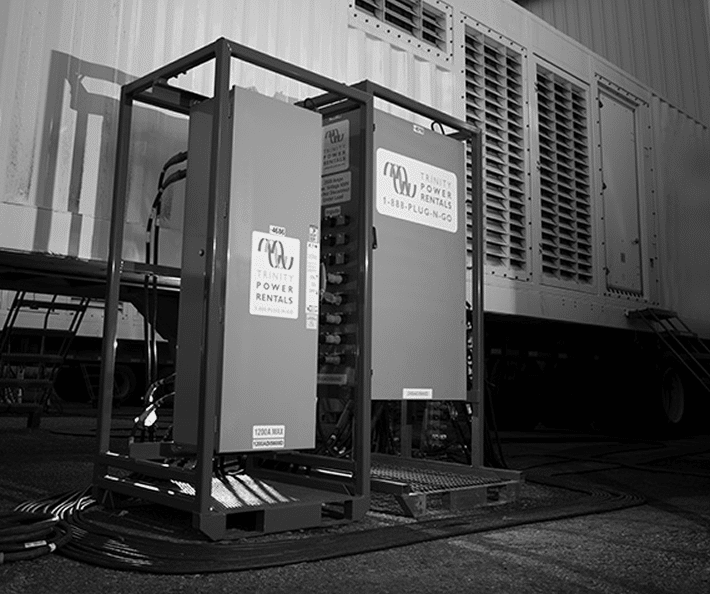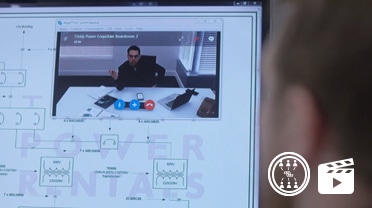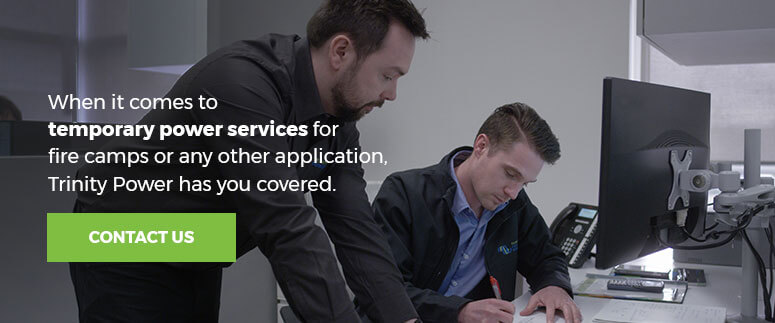- OUR APPROACH
-
COMMITTED TO YOUR SUCCESS
Our approach, developed over decades of experience, is fine-tuned to get the results you want.
We deliver concept-to-completion solutions, designed by temporary power specialists with access to the largest inventory of high-quality power generation and distribution equipment in North America.
-
- Equipment
-
RENTALS
From a wide range of diesel and natural gas generators to transformers, cable, light towers and more, our large rental fleet and extensive vendor network ensure we’ll have the temporary power equipment that your project requires — every time.

-
- Industries
-
INDUSTRIES WE SERVE
For nearly 20 years, we have been at work powering projects across Canada’s industrial sectors.
Select from this sampling of industries to learn how we can put our expertise to work for you.
VIEW ALL- Projects
- About
-
A PROUD HISTORY. A BRIGHT FUTURE.
From our inception in 1998, we have been building our team on a foundation of excellence. Our team members’ passion, expertise and commitment are what have allowed us to grow into a national company with projects across Canada.
Click on the links to learn more about our history, our team or our career opportunities.
- Blog
- Contact
-
Connection, Support and Opportunity
Connections matter. Nothing could be truer of the electrical contracting industry, where relationships with customers, vendors, employees, and even competitors can mean the difference between a thriving business and a stagnant one.
When it comes to making those connections, Electrical Contractor associations can be an excellent resource. In Canada, most provinces have an Electrical Contractor association of some kind. The Canadian Electrical Contractors Association (CECA) — also provides services on a national level. These associations:
- provide education and training
- organize networking events
- offer opportunities for professional development
- lobby for policies that support the electrical contracting industry as a whole
Membership in these associations varies by province but is either voluntary or automatic with membership in a union. And the skills, experience and areas of expertise of members vary widely. In Ontario, we have 11 local ECAs that represent the geographic area.
“We run the complete gamut of electrical contractors,” explains Graeme Aitken, Executive Director of the Electrical Contractors Association of Ontario (ECAO). “We have generational businesses, we have large contractors, and we have multi-trade contractors. And as far as sectors, if it’s in the electrical industry, we have members that do it. So we really do have representatives in the entire electrical industry.”
We spoke with Aitken about what Electrical Contractor Associations do for their members, and how and why electrical contractors should consider getting more involved in their association.
Education and Training: Learn Relevant Skills at a Fraction of the Cost
“Training can be expensive and finding trainers can be difficult, as can determining the subject matter your business might need in order to progress or continue to keep pace,” explains Aitken. “[ECAO] will go to conferences and stay abreast of developments in the industry through national and other provincial bodies. That way we’re able to provide training to our members that would be very costly on a one-off basis.”
The kind of training that ECAO provides includes technical training (Aitken explains that the association prides itself on the highly technical skill set of its tradespeople), as well as health and safety courses.
But perhaps more interestingly, ECAO also focuses on soft skills that its members might need in order to grow their businesses. Some recent examples include labour relations training and a focus on social media, as well as succession planning.
“Everyone provides sort of the same level of competence and what puts a lot of people a cut above the rest is that soft skill set — things like the ability to interact with clients, and the ability to articulate your business’s focus or vision,” explains Aitken. “So we’re very excited about that one because it’s an area that our members haven’t traditionally had training in.”
Lobbying: Advocate for Legislation that Benefits Electrical Contractors
A big component of many professional associations’ mandates is lobbying — but what, exactly does that look like, and why is it important for the typical EC? As Aitken points out: “Contractors are busy. With any business, it’s difficult to find time to do many things that you’d like to do, or that you feel you should do. So ECAO takes the lead in direct lobbying with our labour partners, and interestingly, we do it with our competitors.”
Currently, ECAO is working with several different organizations, including the IBEW, the Ontario Electrical League and the Christian Labour Association of Canada, to create a paper for presentation to the government of Ontario. The paper presents the electrical contracting recommendation for a robust apprenticeship system with no erosion of the current scopes of practice for licensed electricians.
This level of organization, and the power it has to influence government policy is something that would be very difficult for busy, individual contractors to achieve.
ECAO also works with organizations that fall outside the association’s area of expertise on matters that will have an impact on Electrical Contractors. “Prompt payment — something that’s picking up speed around the country — was something that very few of our members were particularly expert in,” explains Aitken. “But through our association, we were able to join Council of Ontario Construction Associations (COCA), a larger group who had that expertise, and put our positions forward to express how potential changes to legislation would impact our members.”
Stakeholder Engagement: Build Community, Career and Business
One of ECAO’s main functions is stakeholder engagement — that is, working with members and affiliate organizations to build the communities that electrical contractors are a part of.
With stakeholder engagement, all of our members have access to a lot more information,” Aitken says. “They can access it through our website, through webinars, through seminars, social media, our newsletters, and other types of communication such as direct calls.”
The association uses a number of tools to engage and connect its members. Says Aitken, “We do membership surveys, and we have regular meetings, so there are all sorts of opportunities to engage with like-minded and like-focused contractors and businesses, as well as to learn about areas into which you might want to branch.”
This kind of networking is one way ECAO fosters career and business growth amongst its members. For example, a contractor looking to expand from low-voltage work into data communications can interact with other members and partner organizations to discover opportunities in that new field.
One of the things that Aitken is passionate about, as he steers the ECAO ship, is mentoring members to grow in their careers.
“We have people who, when I first met them, were a journeyperson electrician, or perhaps they were a supervisor, who are now sitting on our board of directors,” Aitken enthuses.
“I think that if you were to take a look at ECAO over our 70-plus year history, that would be one of the things you would say: ‘Wow, do they ever do a phenomenal job of mentoring people in the industry.’”
Get Involved: Become a Leader in the Field
Different associations will have different opportunities for getting involved but Aitken’s advice applies beyond ECAO. “The key for us is for people to put their hands up and volunteer for committees and subcommittees,” he says. “So if we have a committee dealing with WSIB for example, and we put a call out asking for volunteers, put up your hand, send the email, make the telephone call.”
ECAO encourages its members to get involved at the lower levels — for example, local subcommittees — and learn the ropes before working their way up. This process has resulted in some serious career growth. Says Aitken, “If you took a look at our community, just in Hamilton, we have the head of the IBEW CCO, the chair for the labour group for bargaining and for our Joint Electrical Promotion Plan, the president of ECAO, the past president of ECAO, the president of the Canadian Electrical Contractors Association, and two other board members, as well as the head of the provincial building and construction trade union in Ontario.”
It’s a star-studded list, and ECAO is looking to expand that success and disseminate it amongst its other local chapters, through initiatives like a young professionals committee. ECAO has also launched an ECA newsletter which goes to all their local ECAs.
Building members’ careers and communities is something that Aitken, and ECAO, are deeply committed to doing. “My office is very excited about building that community,” he says.
“When we move out to promote, to market, to educate people about what it is we do; when we’re surveying the industry, when we’re contributing to legislative change, when we’re helping build those communities in which we live, when we’re building our electrical contracting community, it’s exciting to us. We are really looking forward to growing and contributing more, and hopefully quickly.”
Whether an electrical contractor belongs to ECAO or another association, looking for opportunities to get involved in an electrical contractors’ association is a clear path to career growth, business growth and industry leadership.
To learn about how Trinity Power can support your electrical contracting business, click here.
Related Articles
Subscribe for Access to Exclusive Content
Get insider updates, industry news, special equipment offers, and expert tips—directly to your inbox.
"*" indicates required fields






















